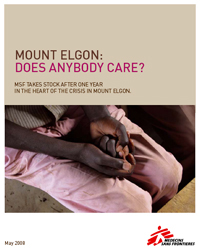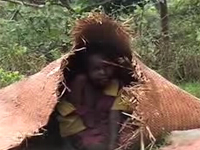Brussels/Nairobi, June 17, 2008 — The international medical humanitarian organization Doctors Without Borders/Médecins Sans Frontières (MSF) is calling for an immediate increase in assistance for the people of Mount Elgon in western Kenya, and an end to the indiscriminate violence they have endured for almost two years.
Since August 2006, the civilian population of Mount Elgon has been trapped in the violent conflict between the Sabaot Land Defence Force (SLDF) militia, which took up arms over a land allocation scheme it considers unfair, and the Kenyan authorities. Tens of thousands have been displaced. Many have lived through atrocities, mutilation, and loss.
Today they continue to struggle to cope. In an overall environment of insecurity, people lack access to basic services, clothing, sufficient food, shelter and blankets. Many dwell in poor shelters where they are exposed to the cold nights of the highlands, and depend on the little assistance available and what help from local communities they receive to survive.
MSF has been providing medical and humanitarian relief to the people living in the Mount Elgon district since April 2007. During this time, the organization has repeatedly sought to draw attention to the violent crisis. Faced with a population that is traumatized from violence of the past years, coupled with humanitarian needs that remain unfulfilled, MSF now feels compelled to speak out publicly.
“Medical aid alone cannot answer the numerous needs of the people in Mount Elgon,” says MSF Head of Mission, Rémi Carrier. “They require protection from violence,increased assistance, and more attention needs to be paid to their plight.”
Throughout time, the authorities’ main response to the unrest has been to meet violence with violence, culminating in the joint police-military operation which was launched on March 9, 2008. During the course of this operation, the conflict has intensified, with civilians enduring attacks, torture and degrading treatment.
“Since the beginning of our activities, our medical teams in Mount Elgon have seen and treated victims of violent trauma, especially from last summer onwards. But it really peaked after the launch of the operation, with more than 250 injured people treated in the month that followed,” explained Carrier. “These victims, mostly adult men, had been injured while being screened for alleged involvement in the militia. For civilians already traumatized, repeatedly displaced and radically impoverished for almost two years now, this has only reinforced their trauma.”
Meanwhile, people continue to fear for violence from the SLDF, too. One woman attacked mid-April and seen by MSF explained : “We have been attacked by four young men on the road. They beat us with pangas [machetes] and told us to lie down on the ground. One man died and I was unconscious. While they were beating us, they said: Tell them that the militia men are still alive.”
Today, as some people return home, the coping mechanisms of the residents and the displaced are stretched to their limit. MSF is calling for an immediate increase in assistance and protection from violence for these people, in order to allow them to restart their lives. As long as violence is met with more violence, with no attempt to address the root causes of the conflict, the situation is unlikely to improve substantially and the suffering will continue.
**************
MSF is one of the very few humanitarian organizations providing assistance to the people affected by the conflict in Mount Elgon. Dealing with the consequences of the violence against civilians, MSF activities since April 2007 focus primarily on providing free medical care through support to primary health care structures, immunization, and mobile clinics in more remote areas. MSF has also established a hospital referral system for medical emergencies and distributed clothes and blankets.
More information on the crisis in Mount Elgon and stories from affected people can be found in an MSF report titled “Mount Elgon : Does anybody care?”, from May 2008.







